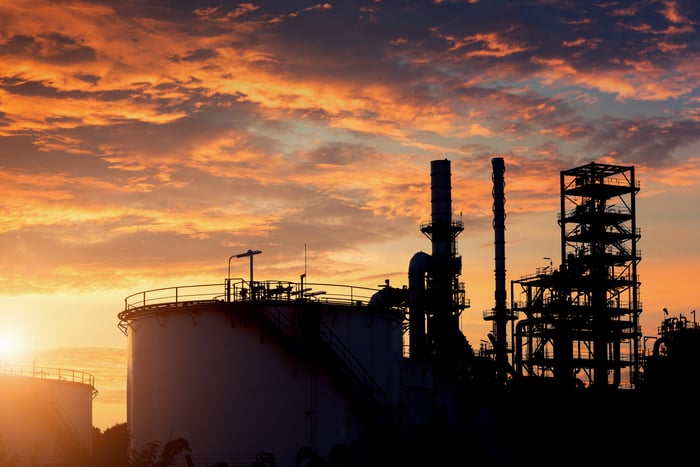ExxonMobil (XOM 0.23%) is having a rough year. Crashing crude oil prices are forcing the oil behemoth to take a record writedown. Meanwhile, it failed to raise its dividend for the first time in 38 years and lost its crown as the largest U.S. energy company. While the oil stock could bounce back if oil prices improve, its best days seem to be in the rearview mirror as the only thing it has going for it is its 8%-yielding dividend, and that's no sure thing.
Because of that, when asked their thoughts on buying Exxon, most of our energy contributors said investors are better off forgetting about the oil giant. Instead, they pitched Enterprise Products Partners (EPD -0.41%), Enbridge (ENB 1.68%), and TC Energy (TRP 0.50%) as better options. Here's why.

Image source: Getty Images.
Big yield, safer dividend
Reuben Gregg Brewer (Enterprise Products Partners): One of the biggest concerns about Exxon today is that it will end up cutting its dividend. Which is why investors might want to examine fellow high-yielding energy play Enterprise Products Partners. This midstream giant owns the pipelines, processing plants, and transportation assets that help move oil, natural gas, and the products they get turned into. It's largely a toll-taker operation, with about 85% of the master limited partnership's gross margin coming from fees.
So volatile energy prices are much less important here than demand for the fuels, which should remain strong for decades to come even as the world shifts toward cleaner alternatives. But, more important for dividend investors, Enterprise covered its distribution by 1.7 times in the third quarter. That's not to suggest that the partnership isn't facing headwinds, because it is (distributable cash flow was basically flat year over year in the third quarter). But Enterprise, backed by a stable fee-based business, appears to be handling the headwinds in stride.
Meanwhile, it is offering a very generous 8.5% distribution yield. That's just slightly higher than what Exxon is offering today. If you are looking at the out-of-favor energy sector and considering Exxon, you might want to shift gears and buy Enterprise instead.
Cash flow supports dividends and renewable investments
Daniel Foelber (Enbridge): On paper, Enbridge and ExxonMobil seem to have a lot in common. Enbridge is the largest midstream stock by market capitalization traded on the U.S. market. On Tuesday, Exxon regained its seat as the largest U.S.-traded oil major. Enbridge sports a 7.5% dividend yield. Exxon yields 8.5%. But Enbridge appears to be the better dividend stock to buy now.
In its recent third-quarter release, Enbridge reaffirmed its guidance for distributable cash flow (DCF) of around 4.65 Canadian dollars ($3.63) per share, well ahead of its $2.49 annualized dividend. Meanwhile, ExxonMobil has struggled to cover its dividend with free cash flow (FCF) since late 2018 -- pressuring the company to substitute FCF with debt to make some of its dividend payments.
Although Enbridge is better positioned to cover its dividend, it's worth mentioning that the company is more reliant on oil prices than its natural gas-focused peers. Enbridge generates a little more than half of its DCF from liquids pipelines, making it susceptible to long-term declines in crude oil demand. It generates a little over 40% of DCF from natural gas transmission, distribution, and storage, with the rest coming from renewables.
In the coming decades, the company expects crude oil growth to stagnate and natural gas to become a dominant global fuel source along with wind, solar, and hydrogen. As such, it's adding mostly solar and wind projects to its renewable portfolio. Although Enbridge won't see substantial profits from most of these projects for several years, they represent what it believes to be a natural part of the energy transition that will help it pay dividends and stay profitable for years to come.
A fully fueled dividend growth engine
Matt DiLallo (TC Energy): Canadian energy infrastructure giant TC Energy has one of the most sustainable dividends in the energy sector. The company generates more than 95% of its cash flow from stable sources like long-term contracts or government-regulated rates. Because of that, there's minimal variability in its cash flow. Meanwhile, the company pays out a conservative 40% of its cash flow to support its 5.4%-yielding dividend. On top of that, it has the top credit rating in its sector. Because of these factors, it has ample financial flexibility to fund the dividend and expansion projects.
That's why TC Energy has full confidence in its long-term dividend outlook. The company currently anticipates boosting its payout by 8% to 10% in 2021 and by a 5% to 7% annual pace after that. Further fueling that view is its industry-leading secured growth program, which includes several oil and gas pipeline projects and a life extension of its nuclear power plant. Meanwhile, the company is continuing to work toward a low carbon future by investing in renewables and other emerging technologies like hydrogen, carbon capture, and batteries. Because of that, TC Energy has plenty of fuel to continue its dividend growth streak, which currently stretches 20 years.
Now, contrast that outlook with ExxonMobil's future. The oil giant had previously promised to double its cash flow by 2025 from 2017's level by investing heavily to grow its oil output. However, crashing crude prices this year are causing the company to abandon that ambitious program as it's gutting $10 billion annually from its investment plan. As a result, the company seems to be in maintenance mode at best, with the potential for a steady decline in its cash flow if oil prices don't cooperate. Because of that, its 8.2%-yielding dividend seems more likely to go down than up in the future. As a result, Exxon seems likely to underperform TC Energy in the coming years, which is why the Canadian pipeline giant appears to be the better option right now.





